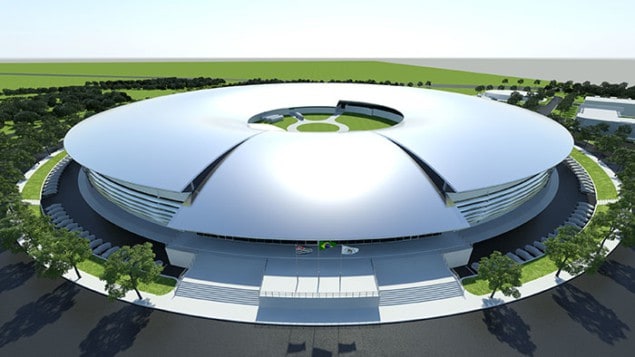
Two major scientific facilities being built in Brazil are facing delays after failing to receive any the funds allocated to them for 2016. The Sirius synchrotron light source and the Brazilian Multipurpose Research Reactor (RMB) have both been hit by federal budget cuts caused by the recent economic slowdown in the country. Any further funding delays could lead to both facilities being put back a number of years.
Sirius, costing $290m, is being built at the Brazilian Synchrotron Light Laboratory (LNLS) in Campinas, some 100 km north-west of São Paulo, and is expected to begin operation in 2018. As a fourth-generation synchrotron light source, it will generate coherent, high-brightness X-rays that scientists will use to study the structure and properties of materials in unprecedented detail.
Critical point
LNLS director Antônio José Roque da Silva says that officials at the synchrotron have not received the money they were promised for 2016 and are still using 2015 funds. Cash for 2016 was expected to be $87.4m, but that has now been cut to $57.7m by the National Congress of Brazil. “Even though this budget is well below our needs, at this moment the critical point is whether we will in fact receive the funds,” says da Silva.
He says it is critical that funding is maintained to allow officials to order equipment. “To keep the planned activities, it is indispensable to receive funds allocated for this year and have the assurance that no new cuts will threaten the $116m [allocated] for 2017,” warns da Silva. “Otherwise it won’t be possible to meet the schedule.” da Silva adds that even if this funding is received, Sirius will still require an additional $76m to make sure it is open by 2018.
Waiting game
The RMB, meanwhile, is located at Iperó, about 130 km east of São Paulo. Costing $500m, the reactor was expected to open this year. By generating radioisotopes, it promises to ensure Brazil does not depend on other countries for supplying radioisotopes for diagnosing and treating cancer. The RMB will also be used for neutron scattering and will carry out irradiation testing for nuclear fuels and materials.
While cash has been spent obtaining the necessary permits for the RMB, including an environmental licence, officials are still waiting for the release of funds to begin construction. RMB’s budget was supposed to be $47.6m from 2014 to 2016, but only $10.6m has so far been allocated. “The prediction was that the reactor would be ready this year, but, in this saga of precarious disbursements and insufficient funds, our time frame will have to be extended,” says RMB technical co-ordinator José Perotta, who is research director at the National Nuclear Energy Commission.
Brazil’s Ministry of Science, Technology, Innovation and Communications maintains that funds for 2016 for Sirius and RMB are “secure”. The ministry says that the cash for next year has been included in the country’s annual budget, although it has yet to be approved by the country’s national congress.



